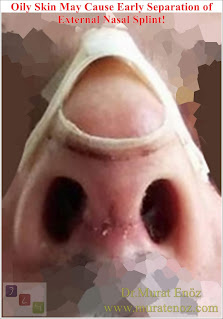Falling Off The External Thermoplasctic Nasal Splint
 |
| External Nasal Splint (Cast) |
It is important that the external nasal splints are placed in the postoperative period in patients with thick and fatty nose skin structure and that the adhesive spray is applied on the skin and the skin is thoroughly cleaned.
It is not a serious problem to separate the external splints in the early period after simple uncomplicated rhinoplasty operations, and the effect of the falling of the nasal cast in early period has limited effect on the simple rhinoplasty operation result.
It is important that the external nasal splints are placed in the postoperative period in patients with thick and fatty nose skin structure and that the adhesive spray is applied on the skin and the skin is thoroughly cleaned.
It is not a serious problem to separate the external splints in the early period after simple uncomplicated rhinoplasty operations, and the effect of the falling of the nasal cast in early period has limited effect on the simple rhinoplasty operation result.
Oily skin can potentially lead to early falling off of the external nasal splint or cast after nasal surgery. The nasal splint or cast is typically applied following surgical procedures like rhinoplasty to provide support, protect the nasal structure, and assist in the healing process. However, for individuals with naturally oily skin or those who do not adequately manage their skin's oil production, certain issues may arise:
Reduced Adhesive Strength: Oily skin can make it more challenging for the adhesive used to secure the nasal splint to maintain a strong and lasting bond. The excess oil can interfere with the adhesive's ability to stick to the skin, leading to a weaker attachment between the cast and the nose.
Early Dislodgement: Weakened adhesive strength can result in the nasal splint becoming dislodged prematurely. This can be problematic because the cast is essential for maintaining the desired shape of the nose during the initial stages of healing.
Compromised Healing: If the nasal splint falls off too soon, it can potentially affect the healing process and the final outcome of the surgery. The cast is not only for cosmetic purposes but also plays a role in ensuring that the nasal tissues heal correctly.
After nasal surgery, please do not touch external cast and nose bandages without informing your doctor and good luck!
On this website, the link group where you can read previously published articles about External Nasal Splint (Cast) >> https://www.ent-istanbul.com/search?q=External+Nasal+Splint+Cast
Murat Enoz, MD, Otorhinolaryngology, Head and Neck Surgeon - ENT Doctor in Istanbul
Private Office:
Address: İncirli Cad. No:41, Kat:4 (Dilek Patisserie Building), Postal code: 34147, Bakırköy - İstanbul
Appointment Phone: +90 212 561 00 52
Appointment Phone: +90 212 561 00 52
Fax: +90 212 542 74 47

Comments
Post a Comment